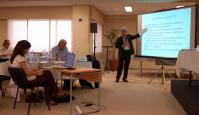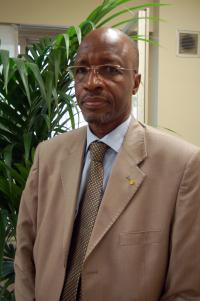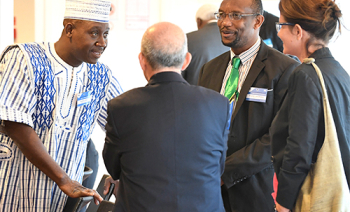The European Commission, like many other donor agencies, is providing growing levels of funds to support decentralisation and local governance in partner countries. At a recent seminar in Brussels, nearly 40 participants from some 25 delegations gathered to learn how development practitioners can strengthen the effectiveness of EC activity in this area with visiting experts from Burkina Faso, France, Madagascar, and Mali.
The Brussels seminar follows two pilot workshops organised in Nicaragua in 2007 and Mali in 2008 on "Supporting decentralisation and local governance in third countries". EuropeAid E4, in collaboration with European Centre for Development Policy Management, organised the first fully-fledged seminar in Brussels, from 6th to 10th July 2009.
EC Staff can download the consolidated minutes, findings and recommendations that came out of that seminar by following this link.
At the opening of the seminar, Francesca Mosca, Director of EuropeAid Cooperation Office (AIDCO), said decentralisation is taking on an increasingly large role in EC and donor activity.
"The challenges faced by partner countries are challenges that can be expressed in terms of peace and security, governance, reduction of poverty or social cohesion - the very seeds of durable development," said Ms Mosca. "These challenges and issues are tightly shared by our institution, which has very clearly taken on the task of accompanying technically and financially, the strategy of decentralisation and strengthening of local governance in a number of countries."
Decentralisation touches many aspects of the work done by development practitioners as it is an integral part of sector programmes and EC projects in political, administrative and financial areas.
Focus of the event
The event and discussions focused on: (1) the concept of decentralisation; (2) the challenges linked to policy dialogue on decentralisation; (3) decentralisation processes in fragile states; (4) political decentralisation and local governance; (5) fiscal decentralisation; (6) the links between decentralisation and poverty reduction; (7) the operational challenges linked to project cycle management, approaches and instruments.
Throughout the seminar, participants had the opportunity to reflect on the effectiveness of current support strategies and EC instruments. They were encouraged to propose venues for follow-up at policy, strategic and operational levels. The EC's Unit E4 also identified possible areas for future engagement in support of delegations, which can be read in full in this report.
Much of the week's events rested on the valuable input of external experts including Mr Ousman Sy (left), former Decentralisation Minister from the West African country of Mali, explained how decentralisation is an opportunity to rebuild the state and give it greater legitimacy, especially in countries with a history of weak institutions. Mr Sy emphasised the importance of decentralisation in reducing the gap between society and formal institutions.
A presentation by Mr. Antoine Sawadogo, former President of the Decentralisation National Commission in Burkina Faso, allowed the audience to critically reflect on current EC strategies and available instruments to support civil society in local governance processes.
Gerard Chambas, a researcher from the International Development Study and Research Centre (CERDI) and a consultant to large financial institutions, presented the concepts, concerns and pitfalls of fiscal decentralisation in sub-Saharan Africa. He also gave a workshop on the fundamentals of optimum taxation at the local level. To see the presentation, Fiscal decentralisation in sub-Saharan Africa, click here.
Findings, operational and policy orientations emerging from the discussions
The week-long discussions highlighted the intensely political nature of decentralisation as a gradual mode of public sector organisation covering political, administrative and fiscal dimensions. Discussions raised the context and sector specific features of decentralisation and its understanding as a "more and better state, where it is needed" on the basis of active subsidiarity. Participants identified the need for response strategies to address three dimensions of decentralisation for improved public service delivery.
Emphasis was laid on the multi-actor and multi-layered nature of decentralisation and on the related need to apply a political economy analysis to inform policy dialogue at all levels. By enlarging the concept of ownership, the Accra Agenda for Action provides the basis to conduct this multi-actor dialogue with Local Government Associations and with non-state actors (NSA). The added value of this multi actor dialogue in assessing the viability of sector policies when considering a Sector Policy Support Programme was also recognised.
Exchanges highlighted different possible modalities to conduct policy dialogue and consultation. As the Ghana experience showed, informal research based processes during instruction emerged as a possibly interesting way to facilitate multi-actor dialogue prior to formal and structured policy dialogue.
Discussions recognised the mixed evidence of the links between decentralisation and poverty reduction but the objective is to understand and support the conditions that allow decentralisation as a public sector mode of organisation to be conducive to poverty reduction. Participants identified that, beyond the equilibrium between the three dimensions of decentralisation and the reinforcement of domestic accountability, further linkages and guidance needed to be developed with territorial development and local economic development in close collaboration with concerned thematic units of EuropeAid.
Last, but not least, a clear consensus seemed to emerge among participants on the need to evolve from a tight "poverty reduction" approach towards wealth creation and redistribution of market opportunities following an endogenous process whereby local actors and authorities play a determinant role.
Reinforcing domestic accountability, particularly at the bottom end of public service delivery in decentralised contexts was also identified as a pivotal issue to mitigate corruption, elite capture and strengthen public sector efficiency and responsiveness. In this context, the increasingly complex role of the EC as a donor and political actor was acknowledged. Emphasis was laid on the need to support accountability based on existing mechanisms to ensure ownership and alignment. For this, some possible operational trails were identified, such as:
- Reinforcement of aid accountability and transparency by getting closer local budgets and aid flows, information systems and open public information meetings
- Experience from participants showed that in initial stages, spaces for accountability are often constructed around specific and concrete stakes such as public basic service delivery and large communication/social mobilisation. An additional entry point for increased domestic accountability may be by including the "actors of accountability" in the process by which indicators are identified, targeted and monitored. Finally, from an institutional perspective, the following elements were also identified: Improvement of data availability on local public management through, notably, the use of decentralised PEFAs (for example, the city of Dakar in Senegal), supporting institutional mechanisms, municipal councils and representative bodies as well as monitoring and supervisory bodies and public information systems.
- Reinforcement and systematisation of involvement of control and audit mechanisms and the promotion of peer review mechanisms.
4- Addressing fiscal decentralisation as the most direct and powerful link to ensure domestic and local accountability. This includes i) the challenge of own-resource mobilisation and promotion of discretionary funds to local governments within EC response strategies and policy dialogue (for example, Benin); (ii) development of performance based funding to establish effective incentives and competition for de-concentrated and decentralised levels to improve performance in terms of equity and transparency; (iii) considering larger public administration reforms within policy dialogue.
The analysis of those elements determines the most appropriate "entry point" to support decentralisation or improving its efficiency, be it top-down or bottom-up processes. Jorge Rodriguez (above right) presented the pioneer bottom-up process approach to decentralisation developed in Madagascar, an island nation off Africa. Mr Rodriguez shared his experience as technical assistant to the ACORDs programme (Appui aux Communes et Organisations rurales pour le développement du Sud) launched in 2004. The ACORDS programme recognises local authorities' legitimate and legal role as public contracting authorities and makes them the natural entry point for supporting decentralisation.
Respecting institutional mandates requires that donors embrace a massive shift in perspective akin to a sort of ‘Copernican Revolution', said Mr Rodriguez. Donors need to put local authorities' accountability at the centre of any equation, be more willing to learn by doing as well as revise the accepted role of technical assistance. To see a ten minute video clip on the ACORDs programme, click on the video below.
In the context of fragile situations, decentralisation was considered as an opportunity to rebuild the state from below. However, participants raised the challenges posed by the application of Art 96 of Cotonou Agreement to local authorities to take this opportunity and the needed harmonisation and clarification of its practice.
All the above raised the challenge of strengthening internal and external coherence and coordination as well as the need to carefully assess the most appropriate choice of available instruments while progressing in the Accra Agenda for Action. A consensus seemed to emerge on the need for complementary and sequencing of instruments on the basis of matching the context specificities to the added value of each of the available instruments. Lessons from experiences and specific challenges were shared by the participants.
Next Steps
The following possible working areas have been identified to develop further guidance:
• Follow up of the thematic Evaluation on Decentralisation in collaboration with AIDCO/G5)
• Fiscal decentralisation (in collaboration with E1)
• Territorial Development (in collaboration with E6, E7)
• Local Economic Development (in collaboration E2, E3)









Log in with your EU Login account to post or comment on the platform.